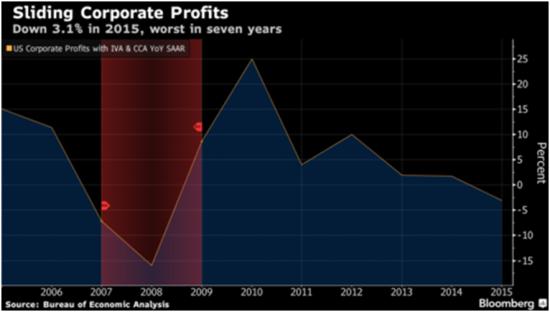
Talk about diminished expectations. This morning’s estimate of 1.4% Q4 GDP growth is being hailed as a pleasant surprise. Which is odd, considering that for most of the past century a number this low would have been seen as weak enough to require emergency action.
And that’s just the headline number. Dig a little deeper and the picture — at least when viewed through a non-Keynesian lens — is of a system in crisis. Consider:
Corporate profits are, as today’s Bloomberg puts it, sliding.

Meanwhile (also from Bloomberg),
A firm labor market and low inflation encourage households to keep shopping. Today’s fourth-quarter growth figure reflected more spending on services, particularly on recreation and transportation. “It’s really U.S. consumers who are powering the global economy forward at this point,” said Gus Faucher, an economist at PNC Financial Services Group Inc. in Pittsburgh.
But if companies are earning less money, how likely is it that they’ll step up hiring going forward? Not very. And since today fewer Americans have full time jobs than in 2007 (making the current stellar 4.9% unemployment rate look like a cruel joke) a new round of mass layoffs will make the job market even more dire for anyone hoping to support a family with full-time work.
“If profits remain depressed, the prospects for capex and hiring will come under greater pressure,” Sam Bullard, a senior economist at Wells Fargo Securities LLC in Charlotte, North Carolina, wrote in a research note.
What are the chances of profits remaining depressed? Pretty good, considering that two of the big growth drivers of the past few years have been student debt and car loans. The former is, as everyone by now knows, at levels that consign a whole generation of kids to life in their parents’ basements — not a recipe for robust consumption.
Car loans, meanwhile, are starting to look like subprime mortgages circa 2006:














